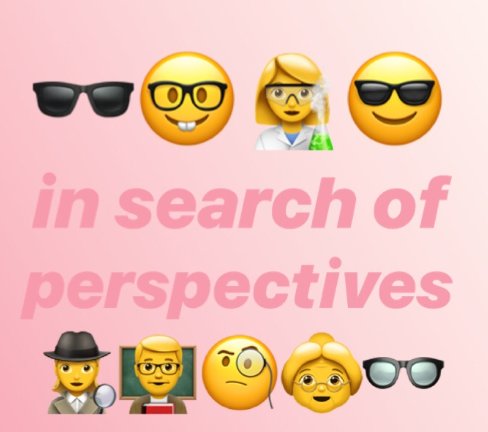In undergrad, I recall having a class discussion about how many ‘hats’ teachers had to wear. It was accompanied by a cartoon with a leaning tower of ball caps precariously placed atop a teacher’s head. I am sure you are all familiar with this comparison. We are the teacher, the coach, the mentor, the comedian, the referee, the detective, the event planner and the decorator – just to name a a few. We are versatile in our skills because we have to be. And while wearing all those hats is an essential piece of my job, I find something more useful is all the lenses I look through.
I own twelve pairs of prescription glasses. They are my accessories. I have pairs for when I want to look professional (Black, Brown, Silver… bases covered for a neutral tone), I have green ones for spirit days (Go Vikings!), a red pair for marching at the capital, a rainbow-striped pair for walking around the farmer’s market on Saturdays, and a few more just meeting my inner fashionista needs. Since I’m not sponsored by them (yet?), I won’t tell you how I afford so many pairs, but you should google ‘cheap prescription frames’ and take a leap of faith that it will work out.
When I swap frames, I do not swap perspectives however. My perception of the world around me does not alter.
But… it is possible to alter my perspective. It is possible to look through different lenses. I could borrow someone else’s glasses and see the world from their point of view. Of course, the clarity of my metaphor gets skewed by science here, but I hope you understand my point: We can and should consider other perspectives when planning, grading, and interacting with our students.
When I began teaching honors English at my alma mater, many people observed: You know their perspective! You were an honors student here!
And for the most part, this observation has rang true. The majority of my students had a similar upbringing to my own. Many of my students have supportive parents, and can afford a myriad of resources that augment their education. So, since I had a similar experience, I feel I know what I can reasonably demand of them.
However, this is not all my students. And it is important that I remember that. It is important that I try to learn about other’s perspectives. But this presents another challenge. I need the students to trust me enough to hand me their frames, and let me look at their world the way they see it.
You wouldn’t loan your glasses to a stranger on the street or even someone you know but do not trust. So, I have to make earnest efforts to build trust so that they let me know how they see the world and where they come from.
For instance, through this blog, honest conversations with peers, students, and a number of people outside my education sphere, I was able to learn about some cultural perspectives.
For me, as a young lad, and many of my students now, the way to ensure a high grade was to advocate for one’s self. Communicate challenges, ask for extensions, explain how busy we are, and argue for a few points back on every essay. But, this behavior seems rude and disrespectful to many people and many cultures. So, it isn’t that students do not care about their grade; rather, it’s that they wouldn’t bother me with an explanation. They would never dream of asking for exceptions, and they certainly would never challenge my authority on an essay grade.
So, the squeaky wheel gets the oil, and my attention (and often a better grade). There are students who respect my policies in my syllabus to the letter, and will accept a zero on an assignment before even dreaming of mentioning that their mother spent the previous night in the hospital. There are students who ask their parents to call me about a grade, and students whose parents would never think this appropriate.
But that doesn’t seem equitable. Maybe it’s easy. Maybe it’s less effort. But considering this perspective, I check in more often with some students and ask them why work is missing or why its half finished, or why they did worse on this vocab quiz compared to last week’s.
I’ve had students tell me very true and real barriers and I’ve had students button up and shrug their shoulders. Sometimes we cannot get more than a shrug. Sometimes they stay quiet. But, I find as I keep trying, and as the year progresses, I get less shrugs and more answers.
Through other intentional efforts to build relationships, plus my perseverance to ask again, I get to learn more and help a unique student with their unique situation. Maybe they failed before, and their ready to learn now. Maybe they simply forgot the assignment at home and never considered asking me for extension. Whatever the case. My eagerness to understand their perspective, and plan for the disparity in perspectives and barriers has shown results in my classroom.
I can put on a new pair of frames every day, and see the world the same. To gain insights, to see things differently, we have to take time to put in the work to find it.
What perspectives have you encountered in your classroom different from your own?
Do you have tips for relationship building?
Leave a comment below!










Comments 1
I love to get to know my student’s interests and to share some of mine with them as well. Immediately, they see their teacher as more human. Knowing that a favorite sports team of theirs won the game on the weekend or asking how their gymnastics meet help to foster that relationship on a deeper level.